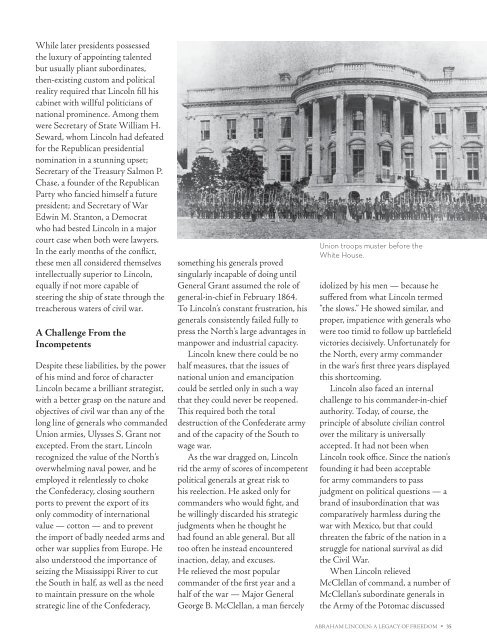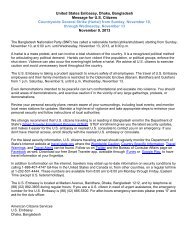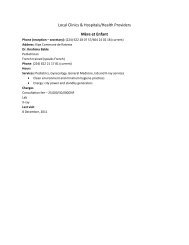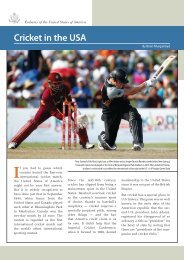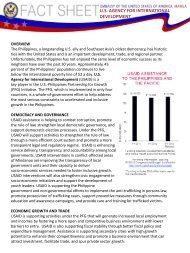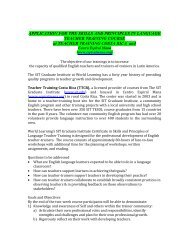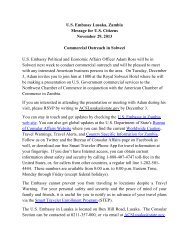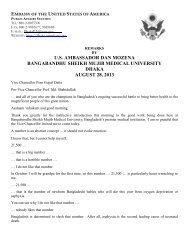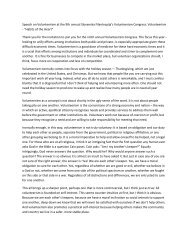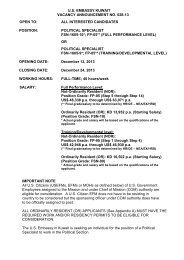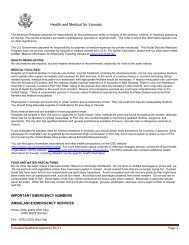Abraham Lincoln: A Legacy of Freedom - US Department of State
Abraham Lincoln: A Legacy of Freedom - US Department of State
Abraham Lincoln: A Legacy of Freedom - US Department of State
Create successful ePaper yourself
Turn your PDF publications into a flip-book with our unique Google optimized e-Paper software.
While later presidents possessed<br />
the luxury <strong>of</strong> appointing talented<br />
but usually pliant subordinates,<br />
then-existing custom and political<br />
reality required that <strong>Lincoln</strong> fill his<br />
cabinet with willful politicians <strong>of</strong><br />
national prominence. Among them<br />
were Secretary <strong>of</strong> <strong>State</strong> William H.<br />
Seward, whom <strong>Lincoln</strong> had defeated<br />
for the Republican presidential<br />
nomination in a stunning upset;<br />
Secretary <strong>of</strong> the Treasury Salmon P.<br />
Chase, a founder <strong>of</strong> the Republican<br />
Party who fancied himself a future<br />
president; and Secretary <strong>of</strong> War<br />
Edwin M. Stanton, a Democrat<br />
who had bested <strong>Lincoln</strong> in a major<br />
court case when both were lawyers.<br />
In the early months <strong>of</strong> the conflict,<br />
these men all considered themselves<br />
intellectually superior to <strong>Lincoln</strong>,<br />
equally if not more capable <strong>of</strong><br />
steering the ship <strong>of</strong> state through the<br />
treacherous waters <strong>of</strong> civil war.<br />
A Challenge From the<br />
Incompetents<br />
Despite these liabilities, by the power<br />
<strong>of</strong> his mind and force <strong>of</strong> character<br />
<strong>Lincoln</strong> became a brilliant strategist,<br />
with a better grasp on the nature and<br />
objectives <strong>of</strong> civil war than any <strong>of</strong> the<br />
long line <strong>of</strong> generals who commanded<br />
Union armies, Ulysses S. Grant not<br />
excepted. From the start, <strong>Lincoln</strong><br />
recognized the value <strong>of</strong> the North’s<br />
overwhelming naval power, and he<br />
employed it relentlessly to choke<br />
the Confederacy, closing southern<br />
ports to prevent the export <strong>of</strong> its<br />
only commodity <strong>of</strong> international<br />
value — cotton — and to prevent<br />
the import <strong>of</strong> badly needed arms and<br />
other war supplies from Europe. He<br />
also understood the importance <strong>of</strong><br />
seizing the Mississippi River to cut<br />
the South in half, as well as the need<br />
to maintain pressure on the whole<br />
strategic line <strong>of</strong> the Confederacy,<br />
something his generals proved<br />
singularly incapable <strong>of</strong> doing until<br />
General Grant assumed the role <strong>of</strong><br />
general-in-chief in February 1864.<br />
To <strong>Lincoln</strong>’s constant frustration, his<br />
generals consistently failed fully to<br />
press the North’s large advantages in<br />
manpower and industrial capacity.<br />
<strong>Lincoln</strong> knew there could be no<br />
half measures, that the issues <strong>of</strong><br />
national union and emancipation<br />
could be settled only in such a way<br />
that they could never be reopened.<br />
This required both the total<br />
destruction <strong>of</strong> the Confederate army<br />
and <strong>of</strong> the capacity <strong>of</strong> the South to<br />
wage war.<br />
As the war dragged on, <strong>Lincoln</strong><br />
rid the army <strong>of</strong> scores <strong>of</strong> incompetent<br />
political generals at great risk to<br />
his reelection. He asked only for<br />
commanders who would fight, and<br />
he willingly discarded his strategic<br />
judgments when he thought he<br />
had found an able general. But all<br />
too <strong>of</strong>ten he instead encountered<br />
inaction, delay, and excuses.<br />
He relieved the most popular<br />
commander <strong>of</strong> the first year and a<br />
half <strong>of</strong> the war — Major General<br />
George B. McClellan, a man fiercely<br />
<br />
<br />
idolized by his men — because he<br />
suffered from what <strong>Lincoln</strong> termed<br />
“the slows.” He showed similar, and<br />
proper, impatience with generals who<br />
were too timid to follow up battlefield<br />
victories decisively. Unfortunately for<br />
the North, every army commander<br />
in the war’s first three years displayed<br />
this shortcoming.<br />
<strong>Lincoln</strong> also faced an internal<br />
challenge to his commander-in-chief<br />
authority. Today, <strong>of</strong> course, the<br />
principle <strong>of</strong> absolute civilian control<br />
over the military is universally<br />
accepted. It had not been when<br />
<strong>Lincoln</strong> took <strong>of</strong>fice. Since the nation’s<br />
founding it had been acceptable<br />
for army commanders to pass<br />
judgment on political questions — a<br />
brand <strong>of</strong> insubordination that was<br />
comparatively harmless during the<br />
war with Mexico, but that could<br />
threaten the fabric <strong>of</strong> the nation in a<br />
struggle for national survival as did<br />
the Civil War.<br />
When <strong>Lincoln</strong> relieved<br />
McClellan <strong>of</strong> command, a number <strong>of</strong><br />
McClellan’s subordinate generals in<br />
the Army <strong>of</strong> the Potomac discussed<br />
ABRAHAM LINCOLN: A LEGACY OF FREEDOM 35


